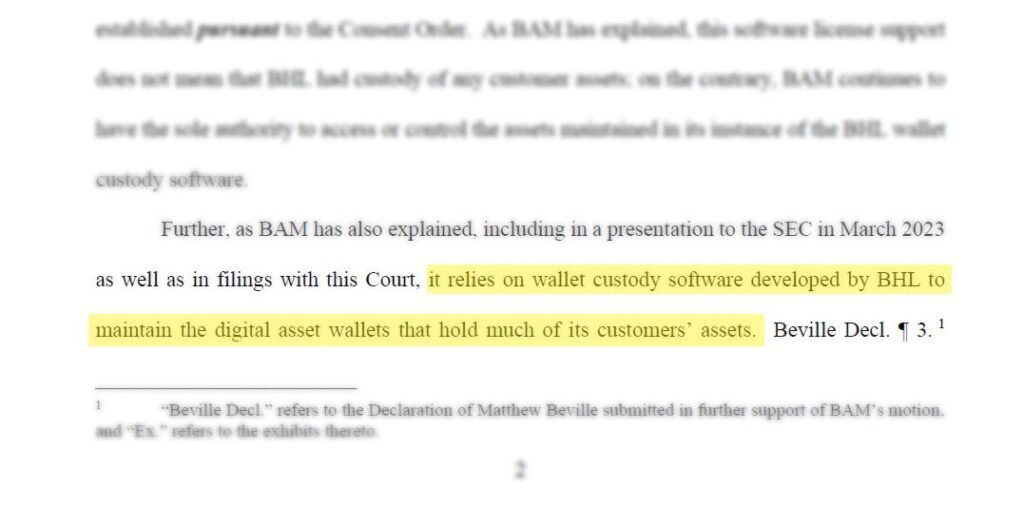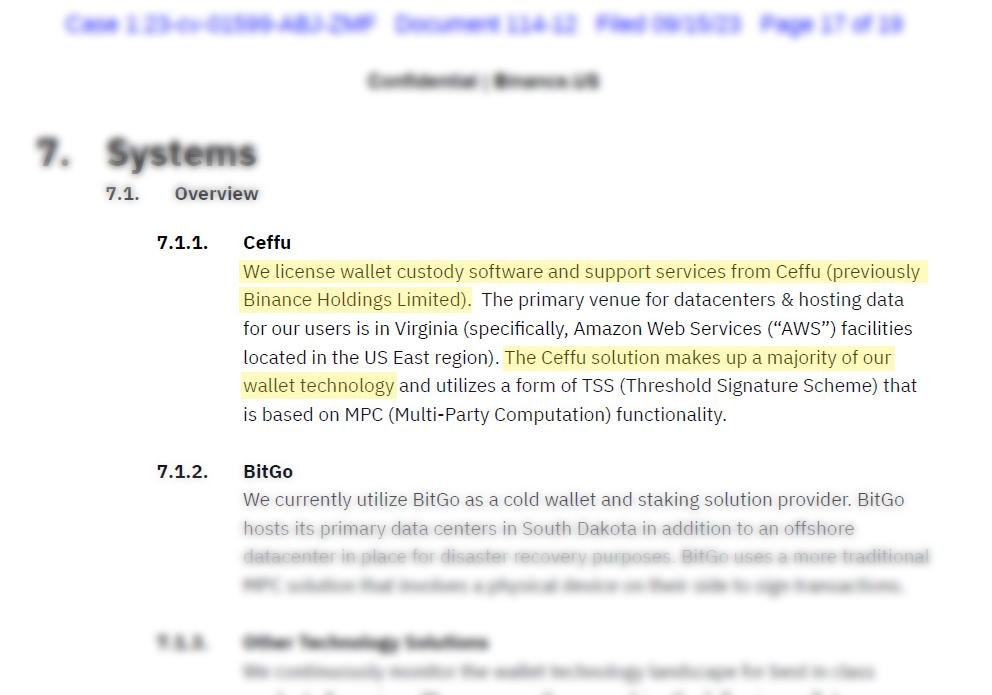Following a judge’s decision to deny the United States Securities and Exchange Commission (SEC) unrestricted access to the Binance.US software during a hearing on September 18, Binance CEO Changpeng Zhao (CZ) turned to X (former Twitter) to address a specific issue in the dispute with the SEC.
CZ refuted allegations that Binance’s U.S. division utilized custody software supplied by its global counterpart, contradicting earlier statements made by Binance.US in their legal documents.
In prior statements to a Washington, D.C. court, Binance.US confirmed that it had employed custody software originally provided by Binance’s global division.

Contrary to these previous statements, CZ claimed Binance.US has never used Ceffu or Binance International custody. (Ceffu is the rebranded digital assets custody service, operated by Binance.)
The SEC has expressed concern regarding the role of Ceffu within the Binance.US ecosystem, primarily due to Binance.US’s commitment to comply with the SEC’s consent order issued on June 17. This order explicitly stipulates that U.S.-based personnel at BAM Trading and BAM Management should have full control over customer fiat assets and customer digital assets, leaving no room for ambiguity.
BAM serves as the holding company for Binance.US. According to a corporate filing from 2022, as reported by Bloomberg in May, the entity overseeing Ceffu was owned by CZ, who is not based in the United States.
According to a court filing made on September 12 by Binance.US, BAM “utilizes wallet custody software developed by Binance Holdings Limited (BHL). It manages the digital asset wallets containing a significant portion of its customers’ assets.” This seems to be stated in court to contest SEC allegations of operating an unregistered digital assets exchange,
The filing goes on to explain that when Binance.US became aware that BHL intended to commercially market the software under the name “Ceffu,” they adopted this name as a convenient reference to the software, using it even in communications with the SEC.
Furthermore, the filing by Binance.US emphasizes that while BAM referred to the software as “Ceffu,” it never implied that the software was licensed from any entity other than BHL. The company has consistently stated its reliance on wallet custody software licensed from BHL in all correspondence with the SEC and submissions to the Court.
By publishing an announcement on its website, Ceffu denied all the allegations and stated it does not service U.S. clients:
In its filing on September 14, the SEC claims that Ceffu has provided third-party “wallet custody software and support services” to BAM. We strongly reject this claim. As a custody technology services provider under Ceffu Holdings, we are committed to servicing institutional clients with digital asset custody solutions in select jurisdictions, excluding the United States, among others.
However, in a document labeled “Confidential” and presented to the court by Binance.US on September 15, titled “Binance.US Digital Asset & Custody Operations Policy,” a section titled “Systems Overview” revealed that Binance.US indeed licenses wallet custody software and receives support services from Ceffu. They admitted that the Ceffu solution comprises a substantial portion of their wallet technology infrastructure.

In 2021, Binance introduced Binance Custody, which was subsequently rebranded as Ceffu in February 2023.
In June 2023, the SEC filed a lawsuit against Binance, citing various allegations including the operation of unregistered exchanges, broker-dealers and clearing agencies, misrepresentation of trading controls and oversight on the Binance.US platform, and the unauthorized offering and sale of securities.
Related reading : Bitcoin Plunges Below $26,000 As SEC Sues Binance
The SEC alleged that BAM submitted approximately 220 documents, many of which consisted of “incomprehensible screenshots and unsigned, undated documents.” Furthermore, the regulatory body accused the company of offering inconsistent information regarding critical details, delaying the release of documents, providing data in small increments, and refusing to cooperate in certain areas where valuable insights into the handling of customer assets could potentially be found.
Related reading : SEC Seeks Alternative Methods To Serve Binance CEO As He Is Deemed “Hard To Locate”
In their remarks, the SEC referred to Zhao as an individual who considers himself beyond the reach of any court’s jurisdiction. The SEC urged the court to dismiss Binance’s partially committed claims of irrelevance, prejudice, and burden, and instead compel the exchange to furnish the depositions, communications, and other information that the regulatory body is seeking.
FAQ
u003cstrongu003eWhat were the SEC’s allegations against Binance.US?u003c/strongu003e
The SEC alleged various violations, including operating unregistered exchanges, misrepresentation of trading controls on Binance.US, and unauthorized offering and sale of securities.
u003cstrongu003eWhat is the dispute regarding custody softwareu003c/strongu003e between SEC and Binance.US ?
Binance.US had initially stated that it used custody software from Binance’s global division, which was later rebranded as Ceffu. However, Binance CEO Changpeng Zhao contradicted this claim, asserting that Binance.US had never used Ceffu or custody software from Binance International.
u003cstrongu003eWhat is the SEC’s concern regarding Ceffu in the Binance.US ecosystem?u003c/strongu003e
The SEC is concerned about Ceffu’s role in Binance.US, especially given Binance.US’s commitment to comply with a consent order that mandates strict control over customer fiat and digital assets by U.S.-based personnel at BAM Trading and BAM Management.
u003cstrongu003eWho owns the entity overseeing Ceffu?u003c/strongu003e
According to a corporate filing from 2022, Binance CEO Changpeng Zhao owns the entity overseeing Ceffu, but he is not based in the United States.
u003cstrongu003eHow did Binance.US respond to the allegations regarding Ceffu and custody software?u003c/strongu003e
Binance.US stated that they adopted the name ‘Ceffu’ as a convenient reference to the software, which was developed by Binance Holdings Limited (BHL). They consistently stated their reliance on wallet custody software licensed from BHL in their communications with the SEC and submissions to the court.
u003cstrongu003eWhat did Ceffu say in response to the SEC allegations?u003c/strongu003e
Ceffu denied all the allegations and clarified that it does not service U.S. clients, stating that it provides custody technology services to institutional clients in select jurisdictions, excluding the United States.
u003cstrongu003eWhen was Binance Custody introduced, and what happened to it?u003c/strongu003e
Binance introduced Binance Custody in 2021, which was later rebranded as Ceffu in February 2023.
u003cstrongu003eWhat is the SEC urging the court to dou003c/strongu003e in the Binance case ?
The SEC is urging the court to dismiss Binance’s claims of irrelevance, prejudice, and burden and instead compel the exchange to provide the depositions, communications, and other information that the regulatory body is seeking.
u003cstrongu003eWhat is BAM Trading, and how does it relate to Binance.US?u003c/strongu003e
BAM Trading is the holding company for Binance.US, and it plays a key role in the custody of customer assets. Understanding its relationship to Binance.US is essential in this context.










